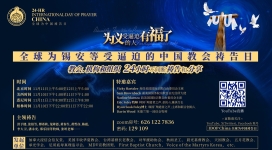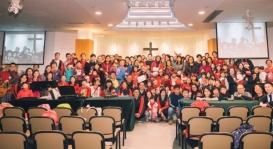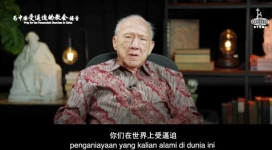Springfield, VA – After leaving a lesbian relationship and committing her life to knowing Christ, Amy Tracy met with her former mate for a coffee chat. Amy wished to share the newfound gospel; her friend reminisced on their past lives as lovers and political activists.
"She said to me, 'Now that you're one of them, all you want to do is put me in a camp,' meaning a concentration camp," Tracy recalled Saturday afternoon during a break in the "Love Won Out" conference, hosted by Focus on the Family. The conference, which took place at a church in Springfield, Va., asserts that it is possible for people to change their homosexual orientation.
After the encounter with her former friend, she questioned the plausibility of such an extreme view from an intelligent woman. But then she realized that she – once holding a position as a feminist activist in numerous high-profile jobs, along with a job as press secretary for the National Organization for Women, held the similar beliefs.
"There's such a separation of worldview," said Tracy, who has worked as a senior writer for Dr. James Dobson, president of Focus on the Family, since 1997. "The gay community really does believe that we're doing harm; that we really are hateful and that we really are driving people to kill themselves. They believe that and they perpetuate that."
As if to prove her point, a coalition of about 12 pro-gay groups gathered in a protest outside the church. Wayne Besen, a spokesman for “John Paulk Welcoming Committee,” estimated the crowd to consist about 70 people.
Besen stated that an “incredibly dishonest” message of the ads in a series of advertisements by Focus on the Family in the Metro public transit system, publicized by The Washington Post and the Washington City Paper provoked the demonstration.
"First of all, they're not telling people that you can be gay and happy or gay and Christian. The second thing they're doing that's wrong is saying that they're about love when in fact they're about politics and opposing laws that protect gay people from discrimination and hate crimes," Besen said.
“None of the stereotypes Focus on the Family presents at its conferences have any bearing on the experiences of most homosexual men and women,” Besen said.
"And I think it's a shame that they can't just stick to what their beliefs are, and have to go down a road of being dishonest and mean-spirited and distorting our lives. That's unnecessary and we urge them to stop doing it now," he said.
What Focus on the Family is not telling conference participants is that every major leader of every "ex-gay ministry" has either renounced it or been caught in a homosexual bar, Besen said, or that "every respected health and medical organization in the country rejects what they're doing."
John Paulk, the focus of the pro-homosexual groups, is a familiar figure to controversy. Fifteen years ago, he removed himself from homosexuality and became actively involved in Christian ministry. In 1992, he married Anne, also a former homosexual. After six years, he joined Focus on the Family as a cultural and policy analyst on gender issues. Currently the Paulks have two sons and are expecting a third.
The pressure of being in the forefront of American Society’s most controversial, and emotionally provocative issues, and the aggrandized celebrity through appearances in Newsweek, People magazines, and in “60 Minutes” have only left Paulk in countless number of strenuous days.
"I did not respond to that stress well and made a stupid mistake," Paulk admits.
On a visit to Washington D.C., two years ago, Paulk made a visit to a familiar gay bar. He was quickly noted by homosexual activists, who viewed his visit as an evidence of Paulk’s hypocrisy and proof to the phrase, “once gay, always gay.”
Paulk stated that the bar symbolized a past place of familiarity and comfort to him years before. His decision to return was like a rash act of a recovered alcoholic who, after a long period of stress, going back to his former habit out of a morbid curiosity to experience the past again.
Paulk insists that he was not drawn to the bar from a sexual inclination. If he was, he states that there were many other less public alternatives. Honesty in the incidence was conducive in his ministry rather than detrimental, he believes, as he notes a jump in attendance at his conferences over the past two years. About 950 attended the conference Saturday, they came from 12 states, including Alaska, reporters noted.
"People are looking for role models that aren't perfect, but who will get up when they fall down," Paulk said.
Rather than avoiding the issue, Paulk has decided to tackle it head-on in his work. The ad Focus on the Family is running features a row of bar stools. Above the picture is the caption: “John Paulk’s back in town. But don’t save him a seat.”
Paulk has not diluted or compromised his message due to the issue. He tells his people that while homosexuality is not a condition that people can easily ignore without strong motivation, neither is it an immutability like ethnicity or skin color.
"I was a gay activist. In my early twenties I marched in parades and that kind of thing," he said.Paulk's message to people on the other side of the debate is very simple, he said: "Your homosexuality is masquerading for hurt and emptiness, and I would just say that if you are unhappy being gay deep down inside, there is a path you can walk down, albeit difficult, and that's the hope I want to offer."
'Argument threatens gay orthodoxy'
Dr. Joseph Nicolosi, president of the National Association for the Research and Therapy of Homosexuality (NARTH), said the growing ex-gay movement Paulk and Tracy threatens the fundamental belief that says people can't change.
A clinical psychologist, Nicolosi is one of a growing number of therapists committed to helping those who want to come out of homosexuality. However, the rancorous debate on homosexuality is often an example for a more general debate on freedom of religion and belief, he said.
"This is not about civil rights, this is not about politics, this is not about religion - they interface, but the focus is on whether or not people have a right to change, or whether people in fact do change. We believe they do," Nicolosi said.
But the fight can be uphill, Nicolosi found. His latest book, "A Parent's Guide to Preventing Homosexuality," has encountered a barrage of hostile reaction, especially from the media and news outlets.
"Homosexuality is a kind of phenomenon people get very emotional about and project all kinds of stuff onto, so the person that's interested in the subject really has to sort out his thinking on this," he said.
"The point we keep making is that you're not born gay and that change is possible," Nicolosi said. "That's our position, and that's a serious challenge to the gay agenda because the gay agenda is built upon the premise that people are born this way and they cannot change."
Opinion studies show that Americans are more likely to accept homosexuality if they believe homosexuality is an inherent, biological consequence, thence immutable.
"But once you introduce the reality that change is possible, you challenge the fundamental premise of the gay agenda. That's why every time a gay person stands up and says, 'I was once gay or I was once lesbian and here I am,' that challenges the very foundation of their position," Nicolosi said.
By Albert H. Lee
-

The World Evangelical Alliance (WEA) concluded its 14th General Assembly
The World Evangelical Alliance (WEA) concluded its 14th General Assembly on October 31, 2025, in Seoul, South Korea, with 850 delegates from 124 countries.
-
Rick Warren challenges pastors at WEA assembly: preach, teach, and heal like Jesus
On the opening night of the World Evangelical Alliance (WEA) General Assembly, Rick Warren issued a heartfelt challenge to church leaders around the world: “Don’t just preach the message of Jesus; learn His model—share the gospel with the poor, the sick, and the broken as He did; pray as He prayed; and build the church as He built it.”
-
[Exclusive Interview] Evangelist Stephen Tong exhorts the Chinese church to return to the foundations of reformed faith
During the 14th World Evangelical Alliance (WEA) General Assembly, Pastor Stephen Tong, the founder of the Reformed Evangelical Church of Indonesia, spoke with Gospel Herald (GH), offering earnest counsel to the Chinese church.
-
Chinese evangelist Stephen Tong urgently calls on pastors to repent and become holy vessels
“You must repent and become holy servants of God.” On the stage of the14th General Assembly of World Evangelical Alliance (October 27-31), renowned Chinese evangelist Pastor Stephen Tong loudly urged the delegates, delivering the shortest sermon of his preaching career.
-
River of Life Foundation Thanksgiving Fair: beyond the church walls—Chinese Christians serve the community with love
The River of Life Foundation will host its 2025 Annual Thanksgiving Fair and Luncheon on Saturday, November 15, at the River of Life Christian Church campus in Santa Clara.






